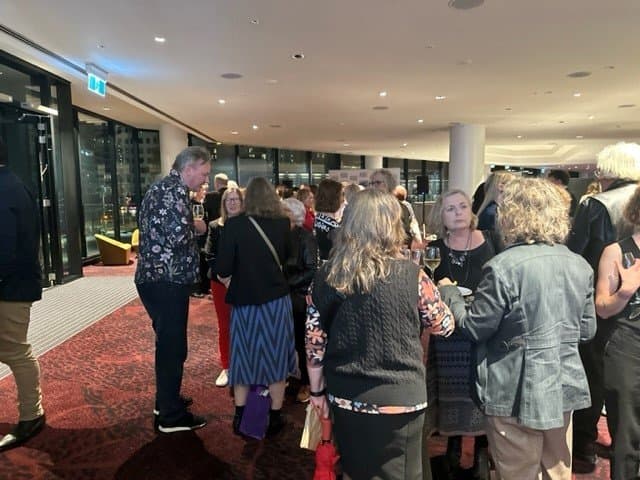Behind the scenes: a reader at the Ockham New Zealand Book Awards
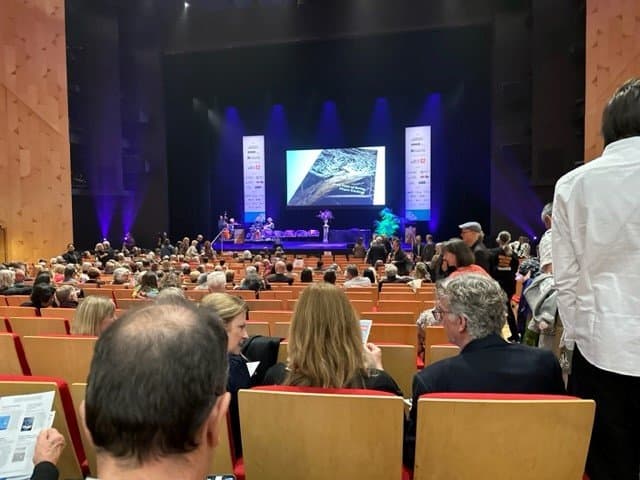
There’s something palpable in the air outside the Kiri te Kanawa Theatre. It’s well before the Ockham New Zealand Book Awards Ceremony begins, only 4pm; the ceremony starts at 7pm sharp. But things are happening. Little ripples, a person or two making their way to the desk in the foyer, asking for their ticket; a sign on the door to the theatre; an author up for one of the major awards on their way to the rehearsal; a gentleman with a black hard-shell box making his way around. The stacked, well-stocked bookshop is in place.
Anticipation.
‘I’ve got this list,’ writes Belinda Cooke, Manager at the New Zealand Book Awards Trust, when I ask her this question: what does it take to make the Ockhams happen?
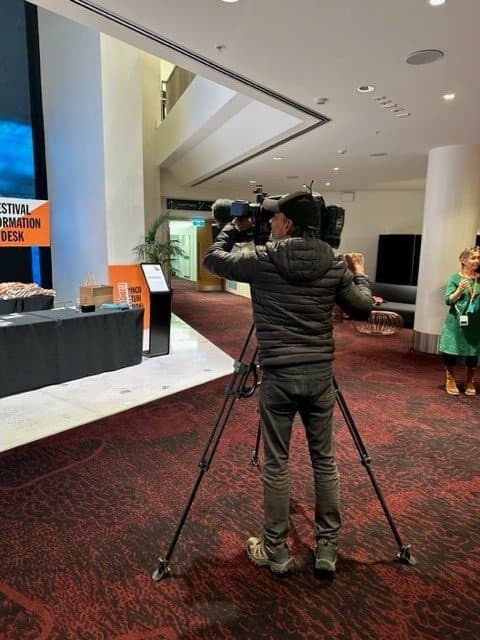
Official photographer grabs some tripod shots outside the door to the Kiri Te Kanawa Theatre.
At that specific moment the list (paraphrased) includes: (many) run-sheets, (many) slide presentations, (one) Prime Ministerial liaison, (one) Police Protection Services liaison, (several) finalists’ briefings, (several) trustees’ briefings, plus venue liaison, catering liaison, ticket management … communications, communications and more communications.
‘Any more,’ she writes, ‘and it won’t get done’.
It takes a lot, before the night, and on it.
Penny Hartill, the publicist for the Ockhams, emails: ‘I’m just desperately hoping, each time the phone rings, that it isn’t someone saying they’ve spotted a leak of the winners’ announcement! (this has happened twice in the last 10 years – but not by the media…)’
It’s a big week for books. The Auckland Writers Festival is around the corner and the Awards are the beginning. It’s an ideal time for them: a celebration of writing from Aotearoa bundled into a festival which is ALL about books.
From time to time the Awards make their way into the media and questions are raised around competition in the arts and how best to fund authors. As a reader, and as someone who has worked on the periphery of the Book Awards Trust, each time I’ve been in the audience on the night, it has felt very much like a celebration of literature, of wonderful writers and writing first and foremost.
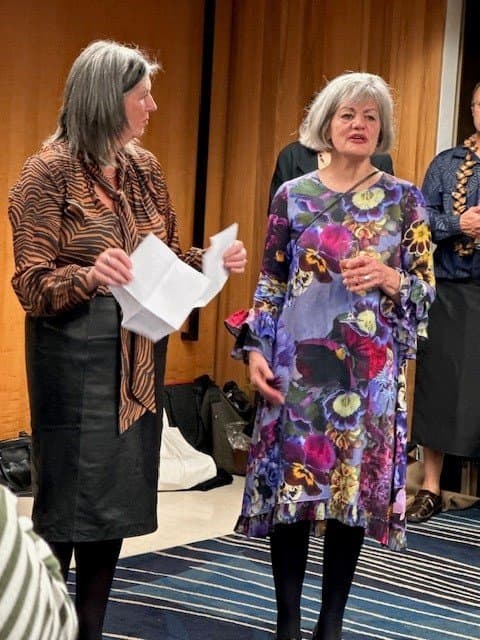
Melanie Laville-Moore and Nicola Legat speak at the finalists’ pre-reception.
It starts as all good shows do, with the rehearsal. At 4:45pm poetry judge Erik Kennedy wanders past, and tells me he’s entirely relaxed, ‘the hard work is done–this is the easy bit.’ I think he might be one of the only people who feels that way.
At 5pm, in the rehearsal, the sense of anticipation is definitely present, and so are the finalists who are attending – including a few who have won before Emily Perkins, Pip Adam – as well as their publishers, and the presenters of the awards. The full ceremony is distilled here to its bones. MC Jack Tame does most of the talking, joking with the finalists about standing at a 15 degree angle for photos on stage, as it shows off your cheekbones. The band is practising. The lighting is on full. It won’t be, during the ceremony.
Everything is scripted, everything is timed (everything at some point has been on Belinda’s list). The Prime Minister stands here. The NZBAT chair, Nicola Legat, will welcome him to the stage and escort him out. The award-givers stand on this X. The finalists, having been instructed in their roles, where to stand, where to sit, who to shake hands with, look a little dazed.
Then a few pre-parties. Ockham Residential, overall sponsor for the Awards, hosts drinks, and further on, in the Limelight Room, drinks and food are laid on for finalists at a pre-ceremony reception, co-hosted by the Coalition for Books.
Many of the finalists are quiet. Barbara Else introduces herself and we talk about her memoir, about learning to sew, and about my neighbour’s lawnmower. Outside the room the photographer is snapping, white umbrellas like something from Illustrated Non-Fiction category finalist Liv Sisson’s incredible book Fungi of Aotearoa. Poet Megan Kitching and her publicist and publisher have flown in this morning. It’s a long day. Megan says she wishes we could celebrate without competition. Belinda pops in, she’s taking a breather from her dealings with Police Protection Services.
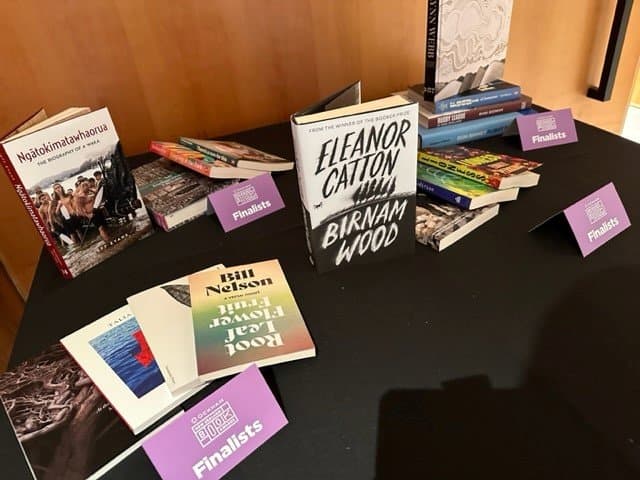
Book tables in every room we enter.
Back downstairs, and the foyer buzzes with people. Seats fill in the Kiri te Kanawa theatre, and the main ceremony begins. All the planning and preparation goes into this moment. The ceremony opens with a mihi whakatau, a welcome, from Otene Hopa for Ngāti Whātua.
Nicola Legat, Chair of the New Zealand Book Awards Trust welcomes the Prime Minister, the Minister for Culture and Heritage, Desley Simpson and a handful of others. The Prime Minister, gives a short speech, and tells us that authors’ stories ‘contribute to our narrative.’
Jack Tame speaks fluidly in te reo Māori, making the audience laugh. He mentions the biggest revolution of the last few years, AI: ‘AI is bollocks. It doesn’t have soul. Tonight is a celebration of soul.’ He goes on to remind the audience that the writing here, the finalists, the longlist, the shortlist… ‘should stir emotion in the most lifeless amongst us.’
Yes!
I think of this later, when the Best First Book Awards, sponsored by the Matatuhi Foundation, are announced. Emma Wehipeihana (Ngāti Tukorehe, Ngāti Porou), winner of the E.H. McCormick Prize for General Non-Fiction for her memoir There’s a Cure for This (Penguin Random House), says that ‘the arts elevate us from being sacks of meat on a dying star.’
Emma Hislop (Kāi Tahu) wins the Hubert Church Prize for Fiction for Ruin and Other Stories (Te Herenga Waka University Press). Megan Kitching wins the Jessie Mackay Prize for Poetry with At the Point of Seeing (Otago University Press). Ryan Bodman wins the Judith Binney Prize for Illustrated Non-Fiction: Rugby League in New Zealand: A People’s History (Bridget Williams Books).
Tā Pou Temara KNZM (Ngāi Tūhoe) is presented with the 2024 Te Mūrau o te Tuhi Māori Language Award for Te Rautakitahi O Tūhoe ki Ōrākau (Auckland University Press). In his touching speech he tells us he’s pleased to receive the award, not for himself, but for the Māori language. He’s just the instrument for the language to flow.
And we roll on toward the awards for Illustrated Non-Fiction, General Non-Fiction, Poetry and Fiction. This is the best bit for a reader: the author readings. Touching, beautiful, funny, winsome, challenging, sweet and tonight, political. Stories.
We start with the General Non-Fiction award. Damon Salesa reads about storytelling; Barbara Else on an invisible friend. Emma Wehipeihana says there were many things she might read but as she has just come from 18 days in a row at Middlemore and her colleagues are striking for fair pay she has decided to read a piece from her work as a doctor during COVID. Jeff Evans shares a piece on one of Ngātokimatawhaorua’s launches for a long journey north.
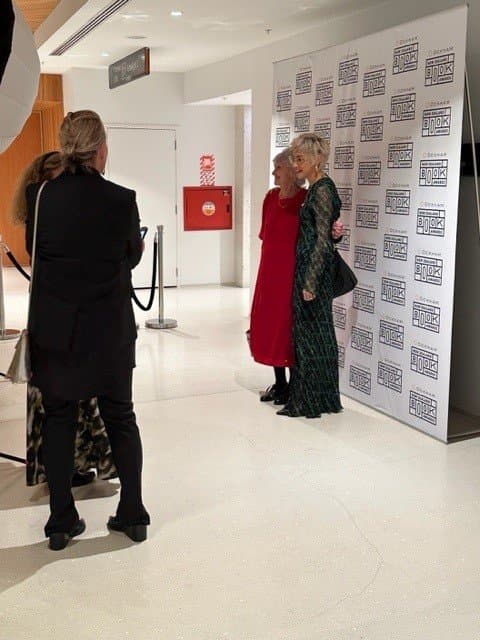
A photo of a photo: Barbara Else and Emma Wehipeihana have photos taken
Auckland University of Technology Vice Chancellor, interdisciplinary scholar and critically acclaimed author Damon Salesa wins the General Non-Fiction Award for his work, An Indigenous Ocean: Pacific Essays (Bridget Williams Books).
The second award and readings are from the finalists in the Mary and Peter Biggs Award for Poetry. Grace Yee is unable to make it as she’s unwell and sends a recording of her poem. Megan Kitching reads her poem about a bee. Bill Nelson (Roots Leaf Flower Fruit) says who you are is what you decide to do next and he hopes that those in positions of power understand that too.
The poetry winner is Grace Yee for Chinese Fish. Paula Morris reads Yee’s acceptance speech and says, with a glint in her eye, that while she can read the speech, perhaps she shouldn’t be trusted with prize money. Jack Tame says he hopes the prize will be ‘a balm’ to speed Yee’s recovery.
As the Illustrated non-fiction authors read from their books images from the internal pages flash on screen. They’re compelling viewing (no doubt these presentations have been on Belinda’s to-do list). Liv Sisson reads from Fungi of Aotearoa in a passage where she was ‘struck by lichening’. The images are dramatic, beautiful, dainty, dangerous.
The winner of the Booksellers Aotearoa New Zealand Award for Illustrated Non-Fiction is writer, poet, artist and curator Gregory O’Brien MNZM for Don Binney: Flight Path (Auckland University Press). In his speech he says something that is a common theme in many of the winners’ speeches, that it takes a community to make a book: ‘[Flight Path] is a weighty book. I couldn’t carry it on my own.’
Then the final and last, the Acorn Prize for Fiction, Emily Perkins and Pip Adam show that sense of community on the stage, greeting each other with a hug. Stephen Daisley can’t be here because of illness, so he’s sent Lieutenant-Colonel Christopher Mullane ONZM MBE to read for him. Another glint in the eye here when the L-C announces that he’s not going to read the piece that Stephen asked him to; instead he reads from the later half of A Better Place.
Pip Adam nails a political reading.
Convener of judges for fiction, Juliet Blyth, calls it a ‘a year stacked with writing royalty.’ And the winner is… Emily Perkins!
In her speech she entreats us all to go to our local library or bookseller and ask for a recommendation for a New Zealand book. There are plenty of options right here, with a bookshop outside the theatre door, a book table at the pre-ceremony reception, and one in the after-reception.
And that’s the end of the ceremony: but not the end of the evening ‘behind the scenes’. Finalists, authors, publishers, Ockham invited guests, booksellers, all head upstairs where they produce their purple ticket and are invited into the after-reception, drinks and street food floating about everywhere, a photo screen, and chat, chat, chat.
A whole industry working on the part of books, of stories, of tales that reflect Aotearoa is behind these awards. We need to celebrate – it matters, and not just for the winners tonight, but for all the books that were published against the odds in a sector that fights tooth and nail to stay alive, and for all the people who support those books. Juliet Blyth, interviewed on Time Out Books’ page, said ‘it’s such a buzz to be there to celebrate the creativity and the accomplishments of our writers, in all fields,’ and I think that nails it.
But the last word is surely Emily Perkins’. ‘Ding dong for books,’ she said at the end of her acceptance speech.
Ding dong indeed.
